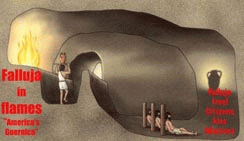The secrecy-busting by Wiki-leakers may take years to play out in the corridors of power, but there are signs on the ground that citizens are finally rubbing the sleep from their eyes. It's an Aha moment: "They've been lying to us all this time". And so they have; law breaking with impunity, instigating  wars, abetting torture, renditions, secret jails; destroying documents, conspiring to steal DNA from diplomats, slaughtering civilians on several continents, plus much else besides and ... weirdly ... getting away with it. For how much longer?
Citizens today resemble the chained prisoners in Plato's cave, mesmerised by the shadowy flickering on the wall, or on our TV's, which we mistake for reality. The images are illusions. Â In Plato's famous parable, a prisoner escapes from the cave and discovers the 'real world' in all its heartbreak and glory, which he seeks to reveal to the inmates. The revelation is unwanted and the escapee is branded a lunatic.
This tale can be viewed from today's perspective, where prisoners of the US military are shackled night and day, brutally beaten, tortured, humiliated, even "disappeared" until they lose all hope of re-entering  a world they once knew. Many prisoners are innocent, and Â- according to numerous accounts - many of the guards are psychopaths.
In October 2001, when the US invaded Afghanistan, an ill educated Australian searching for adventure, David Hicks, tried to flee. Previously he had enlisted in the Kosovo Liberation Army, then fighting against the Serbs in the Balkans, and allied with NATO. Hicks saw no action. A confused and uneducated but idealistic young man, he later sought to fight on the side of the Kashmiri people but changed his mind. Â He had been briefly fascinated by Islam. Hicks was picked up by a Northern Alliance soldier and sold to US operatives for US$5000. As he states in his memoir, Guantanamo, My Journey, the brutal beatings began on day one in Afghanistan and he feared for his life. Like many others traded for cash, he is hooded, shackled, interrogated at gun point, repeatedly kicked, punched in the face, treated to mock executions and sodomised with a "large piece of white plastic" as a US soldier snarls "extra ribbed for your pleasure". Â The sadism is breathtaking Â- and this is just the beginning.
Hicks was among the first batch detainees to arrive at Guantanamo. Plonked on a lump of cement in a barbed wire cage, he is forbidden to look at his jailers . The only authorised positions are to sit or lie in the middle of the cage staring at a fixed spot in the sky or the concrete. The slightest variation provoked an attack from the Instant Reaction Force, who beat offenders to pulp, often accompanied by dogs.
 Everything about Guantanamo is shameful and sick Â- including the inability of President Obama to wipe it from the face of the Earth. The observations of Hicks on his six years of cruel and unusual punishment are corroborated by numerous sources. Not a single soldier has been held to account, not even the ones who murdered three prisoners by stuffing rags down their throats.
Hicks strongly denies that he had any involvement with al-Qaeda and of course he would, and says he had not even heard of the organisation until he was taken to Cuba. However, at a camp in in Afghanistan, he had met Osama Bin Laden which of course begs the question of what sort of camp it was and this understandably excited U.S intelligence. However, does this justify the repugnant behaviour  that has come to light at Guantanamo Bay and elsewhere? Think seriously about this, and if the answer is yes, then we are not who we claim to be.
When Major General Geoffrey Miller arrived at the facility, torments multiplied. "We were no longer entitled to toilet paper", writes Hicks, "We were not allowed soap to wash our hands, yet still expected to eat with our fingers". Inmates suffered prolonged solitary confinement, sleep deprivation, forced medication, forced nudity, pepper sprays, exposure to severe cold and "torture of a sexual nature". It was Miller who introduced attack dogs, and when he was transferred to Abhu Ghraib, he again put them to work. Among the unforgettable series of porno tableaus created by the prison's night shift, Miller's dogs can be seen menacing inmates. (At his retirement ceremony in the Pentagon's Hall of Heroes in 2006, Miller was honoured by the Vice Chief of Staff of the Army, Gen. Richard Cody.)
After 9/11, Neo McCarthyism took hold, traumatizing the media mainstream and reducing its reporters to war mongering hacks. Â In rare moments, when excesses of the US military spilled onto the TV news, such the massacre of children in Afghanistan or the shooting of journalists in Baghdad, an "expert" was corralled to provide "context".
Thanks to Wikileaks, a range of NGO's, independent  film makers, investigative web sites and a handful of defiantly un-embedded reporters, there is a shift in the wind. In John Pilger's latest film, The War You Don't See, you do surprisingly see a range of media heavies apologizing for biased reporting. "I didn't really do my job properly," BBC  reporter Rageh Omaar admits to Pilger. "I'd hold my hand up and say that one didn't press the most uncomfortable buttons hard enough." Omaar describes how British military propaganda successfully manipulated coverage of the fall of Basra, which BBC News reported as having fallen "17 times". This coverage, he says, was "a giant echo chamber".
Veteran CBS news anchor Dan Rather tells Pilger "there was a fear in every newsroom in America, a fear of losing your job... the fear of being stuck with some label, unpatriotic or otherwise." Rather said the war turned reporters into stenographers and that had "journalists questioned the deceptions that led to the Iraq war, instead of amplifying them, the invasion would not have happened". Â This view is reportedly shared by a number of senior journalists interviewed by Pilger.
Australia's media fell head first into the propaganda trap, excited by Shock and Awe and hosting discussions with Pentagon experts, who claimed precision bombing in Baghdad would reduce civilian casualties. Â The crushing of Falluja and other atrocities were scarcely mentioned.
The War You Don't See was screened in Britain in late December and quickly migrated to YouTube and beyond. The response is astonishing. Scales are falling from the eyes of a new generation: I'm speechless, brokenhearted, and appalled at our own complicity... 90% Civilian deaths! ...I could have watched another 3 hours more and still want more. ... Awesome video, thank you all so much...!! Unfortunately, to stop all this, we have to re-think our entire concept of society, authority and personal responsibility and ability... And so on and so on. Â
Even those close to the US Military have been jolted into re-assessing their mission, as in this confession by Tim King from Oregon's Salem-News. "On the verge of understanding my own role in promoting the US wars overseas as a former embedded reporter, John Pilger's new program shoved me right off of the cliff of ignorance, into a painful valley of understanding. I always thought I had a moral 'out' because even though I was a Marine, the only thing I ever shot in a war was my television camera. But as it turns out, when I confront this demon; I discover quite clearly that however small in comparison to some reporters, I was part of the problem. Â
In this age of terror it is time to focus on homegrown terrorists who pose as saviours; the gutless assassins of the CIA and its secret affiliates, flinging Drones at impoverished tribes, killing the good and the bad and the babies, just like in Vietnam.
(Note: You can view every article as one long page if you sign up as an Advocate Member, or higher).






